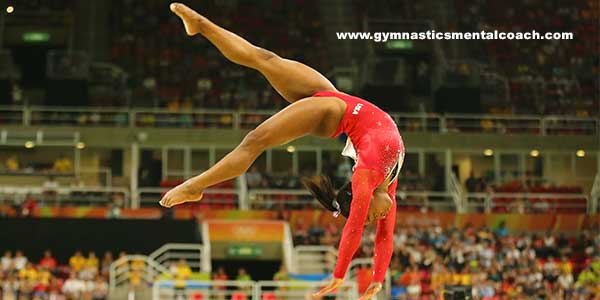
Regaining Composure after a Mistake
Would you believe it if you were told that you could experience the major frustration of a fall and the joy of a personal best routine all within the same meet?
Many gymnasts would never believe that around the corner of failure lies success.
Too often, gymnasts have difficulty rebounding after mistakes, a fall, stepping out of bounds, an under-rotated landing, or bad score.
The emotional impact of a mistake during a meet can be so intense that it throws off your focus, confidence and composure.
Take for example Sheila…
Sheila is a Division I gymnast who has competed at a high level from an early age. Sheila’s best event is the vault.
Sheila’s vault has a high start value and her form is impeccable, Sheila gets great height and consistently nails her landings.
The vault is an event Sheila can rely on to score high… Unfortunately, in one meet against a rival collegiate team, Sheila made several uncharacteristic mistakes in her prior event, the uneven bars.
Sheila fell from the bars twice and under-rotated her landing. Sheila scored low and was visibly shaken afterwards.
Sheila experienced such intense emotions after the uneven bars that she had difficulty calming herself prior to the vault. Sheila balked on her first attempt.
On her second attempt, Sheila just couldn’t generate enough runway speed and failed to get the necessary height needed to perform the skill properly.
Sheila had the ability to score high on the vault but her intense negative emotions hurt her focus and impeded her ability to nail her routine. It’s hard to regain focus, but you cannot allow one mistake to snowball and throw off your entire meet.
The reality is no routine is ever “fully perfect.” In order to have a successful career in gymnastics, you need to learn to manage that frustration and regain your focus for the next event.
Case in point… At the 2019 U.S. Women’s Gymnastics Championships, Simone Biles, Olympic gold medalist and 6-time National Champion, became the first female gymnast ever to perform a double-twisting, double somersault dismount from the balance beam.
This new standard was preceded by a first day where she made an uncharacteristic mistake on her floor routine that visibly angered Biles.
BILES: “As soon as I fell on floor, I was like, ‘That’s it, I’m scratching the meet. I’m walking off the floor.”
Biles was able to manage her emotions, regain her focus and finish the meet with a historic vault routine.
BILES: “I just shut it out. I’m here to do a job.”
Biles noted how difficult intense emotions can be but you can train yourself mentally to rebound despite previous mistakes.
BILES: “I’m still really upset about floor. I did end on a good note, so that makes me happy–but I’m still disappointed about floor. I still get really frustrated because I know how good I am and how well I can do… so I just want to do the best routine for the audience and for myself out here.”
Biles is an excellent example of how strong mental skills can help gymnasts to regain their composure and focus after a mistake and still reach a new performance level.
Refocusing After a Mistake:
Regaining focus requires that you let go of the mistake first so you can stay calm and composed. After her mistake, Biles said she just wanted to throw the past routine in the trash and start over.
That’s a great strategy to move forward. Visualize yourself crumbling up the routine like a piece of paper and throwing it in the trash.
Flush it down the toilet. Think about “water under the bridge” as that’s in the past and you can’t change it.
As Ken Ravizza would say to his athletes: “In order to control your performance, you must first be in control of yourself.”
Related Articles:
- Are Mistakes Good or Bad in Gymnastics?
- Perfectionism And Coping With Mistakes Video
- Getting Past Mistakes In Gymnastics
*Subscribe to The Sports Psychology Podcast on iTunes
*Subscribe to The Sports Psychology Podcast on Spotify
Improve Your Consistency With Sports Psychology for Gymnasts
Sports psychology for gymnastics helps serious gymnasts like you to uncover the beliefs and attitudes that keep you from performing to your potential. You’ll learn mental game strategies to overcome performance plateaus, lack of consistency, and perform at your peak more often.
You can get expert mental coaching with us from anywhere. Meet with Dr. Cohn via Skype, phone, FaceTime, or GoTo Meeting. With today’s video technology, we are able to connect with athletes and coaches all over the globe.
Please contact us today to learn how mental coaching for gymnastics works and to request pricing on all mental training programs for gymnasts. Complete for web form to contact us via email or call us toll-free.
Input your name, email, and role below:
Or Call us today at 888-742-7225
